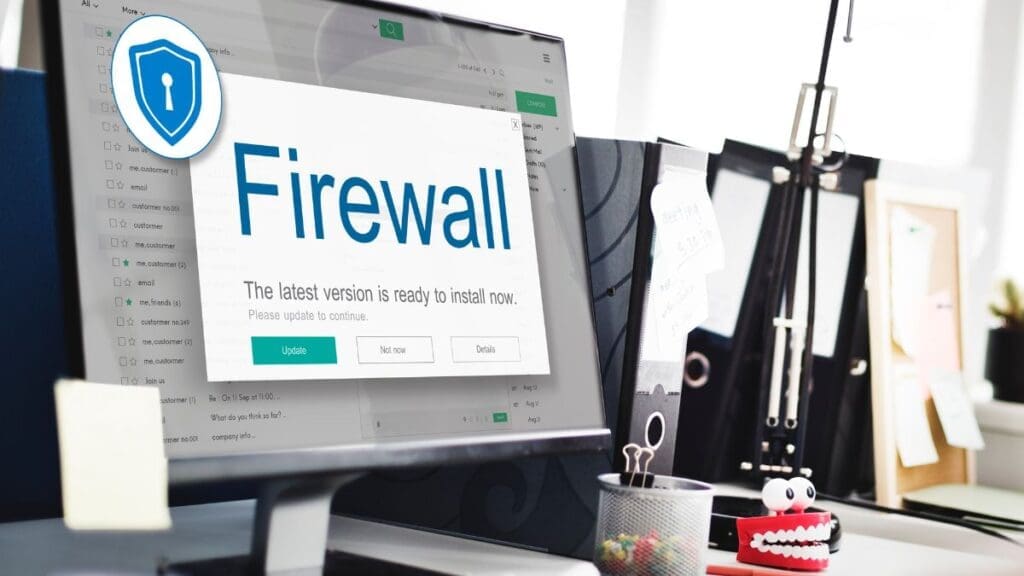What is a Firewall?
A firewall is a security system that sits between your website server and the web. A firewall can be summed up as a digital gatekeeper monitoring traffic entering and leaving your website. It examines tiny pieces of information sent over the internet (called packets) to see if they’re safe or should be blocked based on security settings.- WAF or web application firewall is a firewall created for the protection of a web application. It inspects HTTP traffic to the web application.
- Firewalls are your website’s first line of defence against hackers trying to take advantage of weaknesses within your code, plugins, or content management system (CMS), for example, WordPress.
How Firewalls Work?
Whenever a user or bot requests access to a website, it crosses through multiple checkpoints before making it to your web server. Here’s what happens step by step.1. Traffic Filtering: The web application firewall checks each request sent to your web applications (such as your website) for malicious traffic such as SQL injections, XSS, etc.
Table of Contents
2. Rule-Based Blocking: It employs a structured set of pre-determined rules to either limit, allow, or block the request altogether.
3. Real-time Monitoring: Modern firewalls utilize AI and threat intelligence databases to detect suspicious IP addresses and known attacks.
4. Outbound Protection: Firewalls monitor outgoing traffic to make sure no sensitive information is being sent out with malicious intent.
Essentially, the best firewalls are a vigilant guard always on duty, sifting out unwanted traffic and allowing the good in.
Common Cyber Threats Firewalls Defend Against
Hackers use different attack methods to hack a website. Most of these attacks are blocked from getting into the laptop with a good firewall.
Here are some of the most common threats firewalls protect against:
- SQL injections occur when an attacker injects malicious code into a database query. This can result in stolen or altered data. A firewall detects and blocks such manipulative requests.
- Cross-Site Scripting (XSS) is an attack that injects malicious code into your webpages in order to steal your users’ information. Firewalls filter these scripts out.
- Vomiting-attack is a Denial of Service (DoS). A flood of unwanted traffic is launched towards a server or system, causing the target to be unresponsive to legitimate requests. Firewalls identify and block attack traffic, keeping your site live.
- The presence of a firewall helps prevent hacking attempts from taking place. These could include malware file uploads which could damage your security.
- Hacking of password via brute force attacks wherein hacker attempts to guess your passwords using repeated logins. When a firewall detects this, it will sometimes block the attacker’s IP.
- Data Theft and Unauthorised Access: Through the blocking of dubious IPs and implementation of authentication rules, firewalls help protect sensitive customer data.
Types of Website Firewalls
Not all firewalls are the same. Website setup, web hosting of your website and security levels are important to consider. Here are the main types.a. Network Firewalls
These are installed on physical or virtual servers. They prevent external access to internal networks. Helpful for organizations dealing with sensitive data.
b. Cloud-Based Firewalls
Hosted in the cloud, these are easy to set up and maintain. They moderate the traffic to your website through the providers’ servers to ensure your site does not get attacked. Popular examples include Cloudflare, Sucuri, and Akamai.
c. Web Application Firewalls (WAF)
WAFs are specially designed for web applications and check HTTP traffic for website threats. These malware scanners are especially good for protecting sites made with a CMS like a WordPress website, Joomla website or a Magento website.
d. Next-Generation Firewalls (NGFW)
Next-generation firewalls incorporate the traditional firewall capabilities along with new and improved functionalities such as deep packet inspection, intruder prevention and these systems apply machine learning for intelligent defence.
Benefits of Using a Firewall for Your Website
Using a firewall has long-term and short-term benefits. Here are the top benefits.a. Enhanced Website Security
A major advantage of firewalls is they block the entry of criminals trying to hack. Your business’ digital reputation and customer data are kept safe.
b. Improved Website Performance
A lot of cloud firewalls have CDNs which cache and deliver content to audiences worldwide faster. This boosts site speed and reduces downtime during attacks.
c. Reduced Maintenance and Downtime
Firewalls prevent your website from going offline or being defaced by hackers by automatically updating and maintaining your website security.
d. Better Compliance
Fulfilling legislation such as GDPR, HIPAA, PCI DSS. A firewall can help enterprises that deal in sensitive information (financial, health-related, etc.).
e. Peace of Mind
It’s so nice to know that the website has got an intelligent barrier against hackers. This gives peace of mind to focus on the business without worrying.
Best Practices for Maximizing Firewall Protection
Setting up a firewall is a must; however, the configuration and maintenance of a firewall is more important. Follow these best practices to ensure optimal protection.- Select Trusted Firewall: Choose a reputable solution like Cloudflare, Sucuri or AWS WAF.
- Update the Rules and Patch Regularly: Each day, cyber criminals develop new tricks. Ensure your firewall is always up to date.
- To make sure your data is transmitted safely, combine firewalls with SSL certificates and enable HTTPS.
- Check out the traffic logs of your firewall and access control system for any nasty stuff.
- Add Other Layers Of Security: Use a malware scanner, establish regular backups and strong authentication, along with your firewall for extra security. Wherever possible, restrict backend or admin panel access to certain IPs.
Role of Firewalls in SEO and Business Trust
Website security is a factor in your SEO ranking position Google prefers websites that are secure with HTTPS and security measures. If your site is hacked, Google might label it as unsafe, causing you to lose ranking and visitor trust. A firewall leaves websites up and running, improves loading time, and keeps users’ data safe – all of which make a site more credible and better ranked by search engines.Final Thoughts
In today’s world, a firewall is not merely a luxury or an option but rather a necessity, especially for a computer. Experts warn that cyberattacks are becoming more sophisticated. Furthermore, successful attacks on even minor vulnerabilities can lead to data breaches and lost revenues. The website firewall is everything. It doesn’t matter whether it’s a personal blog or a massive website with complex features, turning on a website firewall (web application firewall, WAF) at all times can protect your website from hackers, bots and malicious automated scripts. When you use a firewall with regular security updates, SSL encryption, use of strong passwords, you provide multiple layers of security to keep your website safe, secure and trusted.Our cybersecurity and website protection solutions offered at Auxilium Technology are as per your business needs. Our team makes sure that your digital assets are secure by configuring the latest firewalls and monitoring tools. They also take care of any potential threats so you can focus on growing while we deal with your website.

